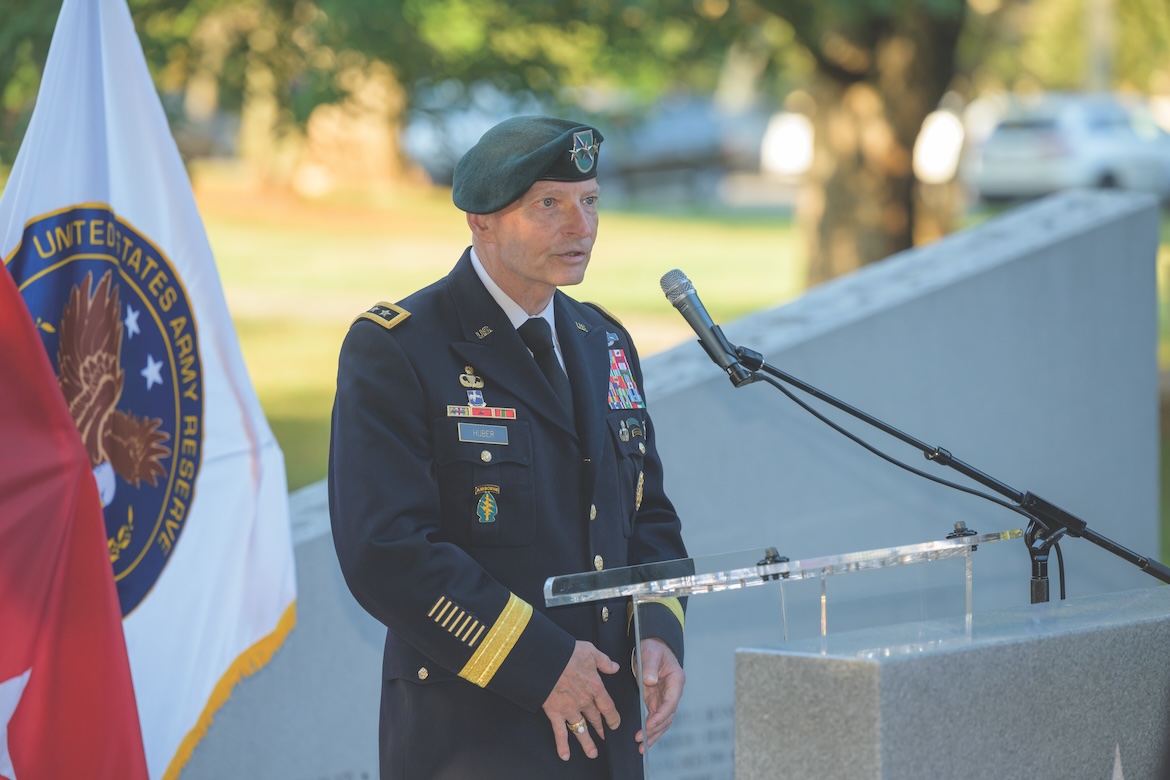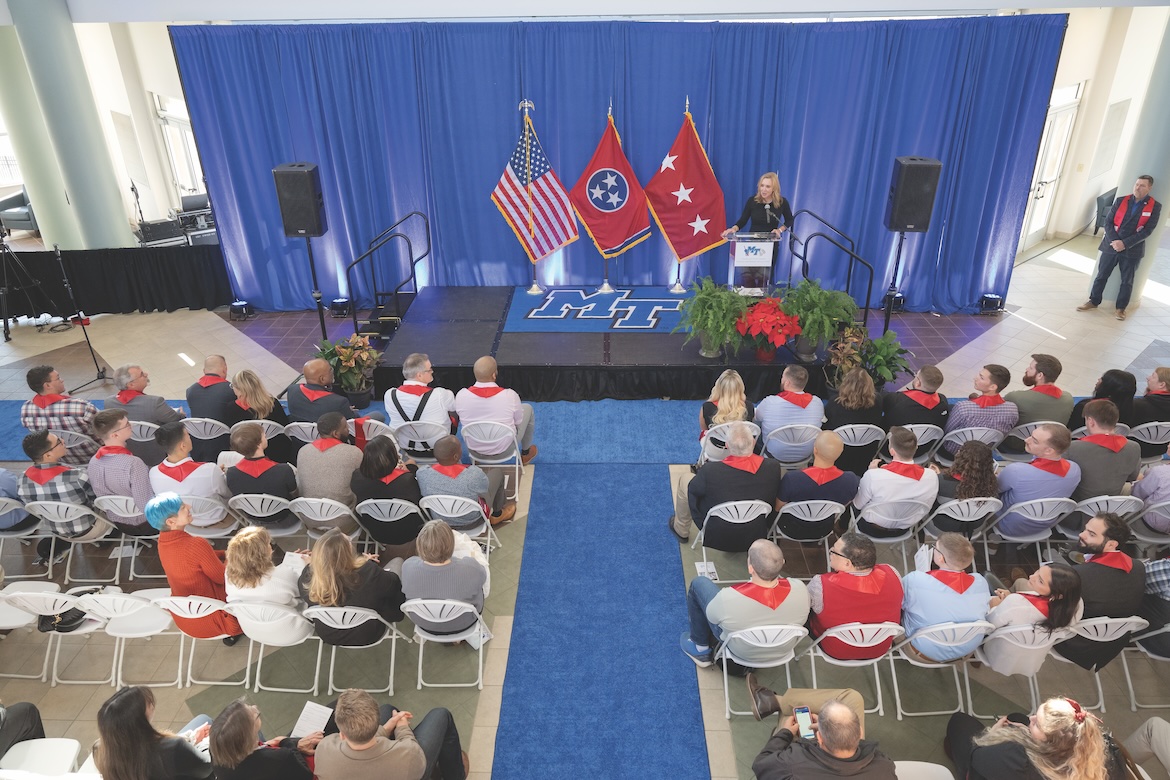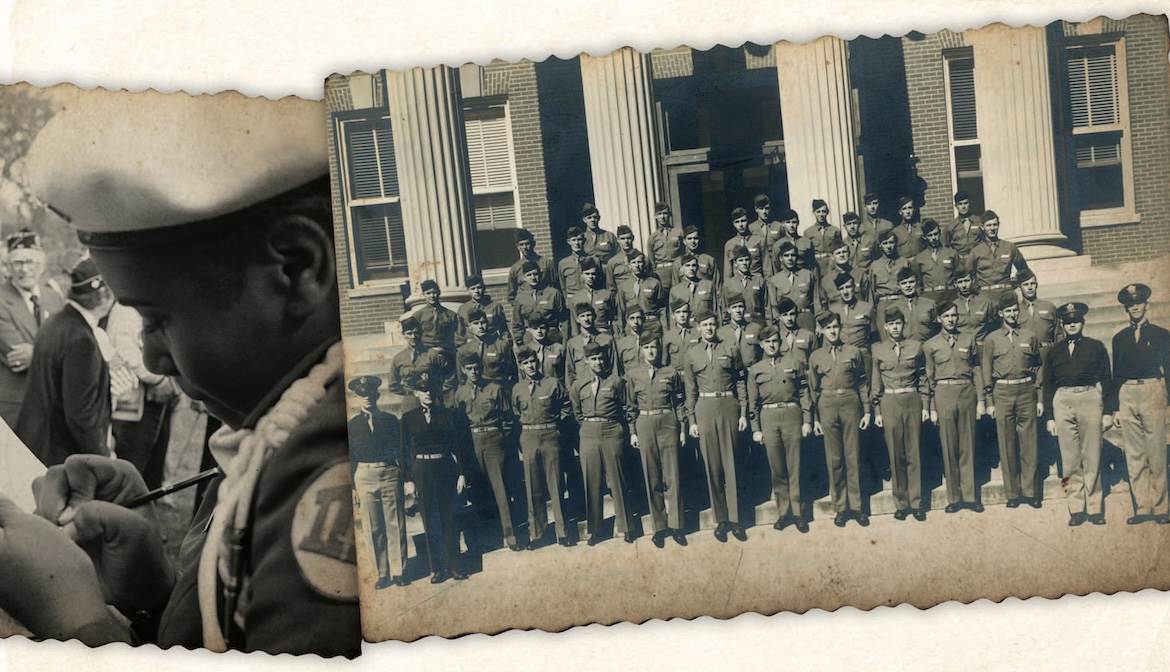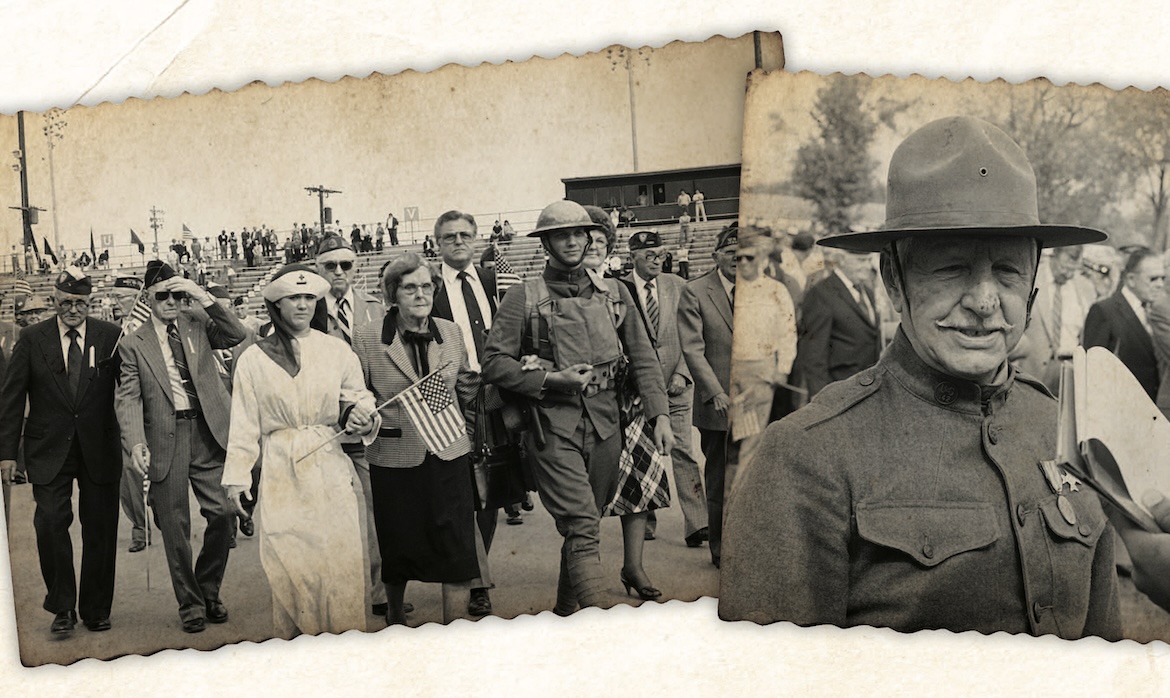
16 minute read
On the Front Lines

Steeped in history, and boasting Tennessee’s top student-veteran support center, MTSU ranks among the nation’s most military-focused universities
by Drew Ruble
In the heart of Middle Tennessee State University’s sprawling, 515-acre main campus sit two neighboring roadways: Normal Way and Military Memorial.
Normal Way honors MTSU’s origins as a training ground for public school teachers. Founded in 1911 as Middle Tennessee State Normal School, it derived its name from the French phrase école normale —meaning teacher-training institutions intended to establish a “norm” after which all other schools would be modeled.
Since being a teacher was one of the only professions available to educated women in the early 1900s, MTSU’s earliest enrollments consisted primarily of female students. Some years, during war times, there were hardly any men enrolled at all, dropping to 28 male students in 1943 and 20 in ‘44.
The military changed all that. Military Memorial honors MTSU’s proud history as both a training ground and residential community for soldiers and their families.
During World War II, school President Q.M. Smith helped the institution recover from the Great Depression by securing valuable training contracts with the military industry utilizing the college’s pilot-training program (which featured a tarmac that ran right through the heart of campus!)

Thanks to Smith’s leadership and these war programs, the school began to take on a new identity. The government funding boosted its reputation as well as its bottom line. And when the war was over, the people who had worked and trained at MTSU used their GI Bill ® benefits to come back to campus and get an education. So many veterans enrolled, in fact, that the college built barracks-style housing on campus for soldiers and their families. Relics of those bygone days are still visible today. For instance, an airplane hangar still stands on the north side of campus.
The proximity of Normal Way and Military Memorial epitomizes MTSU’s historical identity as an institution. Education and military culture are each deeply embedded into MTSU’s DNA. They personify the University’s past and were crucial elements in forging MTSU’s brand. They remain pillars of who and what MTSU is today.
Fertile Soil
The 2011 opening of a new College of Education building served as proof of MTSU’s ongoing commitment to teacher education.
The 2015 creation of what would eventually be named the Charlie and Hazel Daniels Veterans and Military Family Center—the most comprehensive veterans and military family center at a university in Tennessee—provided similar proof of the University’s ongoing commitment to military personnel and student veterans.
Transitioning from military life to college is a daunting task. The bureaucracy surrounding admissions, registration, and educational benefits can be confusing and complicated.

Many veterans are older, with established careers and families, which can be isolating among classmates starting college straight out of high school.
MTSU’s 3,200-square-foot Daniels Center provides service and support for the thousands of veterans and family members who attend MTSU. Everything a student veteran needs to succeed is available through the center, from getting advice on courses and completing government paperwork to getting questions answered about benefits and employment opportunities.
Conveniently located in the Keathley University Center not far from both Military Memorial and Normal Way (and not far from where planes used to take flight and land on the campus airstrip), the Daniels Center is a one-stop shop for student veterans. But even prior to the center’s opening, MTSU boasted a long and proud history of offering programs and initiatives in support of student veterans.
As far back as the 2000s, a motivated group of MTSU staffers and professors who were veterans themselves formed a Veterans and Military Affairs Committee. They met regularly (and still do) to discuss concerns like how to deal with students and professors’ getting called to active duty midsemester. They wrote policy and submitted the work for University approval.
“MTSU had all of these wonderful assets on campus, but they were just kind of spread about campus. They weren’t necessarily under an umbrella,” said Hilary Miller, the Daniels Center director and a campus pioneer on veteran outreach efforts long before the center came to fruition. “We were very much fertile ground. We had already done a lot of the work.”

In 2004, a campus committee began fundraising to create a Veterans Memorial. Its 2009 completion and unveiling recognizes the contributions of alumni and others who have served the nation’s armed forces since 1911. The memorial hosts a variety of annual events that honor veterans and future military leaders, including new officer commissioning ceremonies for the MTSU Army ROTC, the kickoff of the University’s annual Salute to Veterans and Armed Forces celebration, and a special remembrance ceremony each September 11 for victims of the 2001 terrorist attacks.
No other college campus in America boasts a similar Veterans Memorial.
“We were able to do it and to raise funds quickly because this community was receptive to that,” Miller said.
In 2011, MTSU became the first institution of higher education in the state—and one of the first in the country—to partner with the U.S. Department of Veterans Affairs’ new VetSuccess on Campus program. A VA mental health counselor was later added to expand services offered on campus. Such continuous progress paved the way for organizers to finally gain support for additional veteran-focused campus initiatives—notably, a full-fledged veterans center.
But to get there, the University needed a true general to lead the charge.
Man on a Mission
LTG(R) Keith M. Huber, a retired three-star general, spent 38 years in the U.S. Army, 14 of them as a general officer. When he retired from the military in 2013, his résumé had no corporate equivalent: His workdays sometimes involved combat. His business trips were tours of duty. His operating budget was $960 million. His meetings were often with heads of state or the Joint Chiefs of Staff.
After he became a civilian for the first time since heading to West Point at 18 years of age, Huber pondered the path before him. To his mind, true retirement was out of the question, but so were many of the careers available to someone with his rarified skill set and political leverage.
“I consciously decided not to work for a defense contractor or be a news commentator or criticize other people or allow politicians to use my words and my experience to bludgeon other people,” he said.

Service is built into a soldier’s DNA, he added. He wanted to serve.
So, from his home in Franklin, he contacted academic institutions throughout Tennessee that had ROTC programs and offered to speak at commissioning or awards ceremonies—or anywhere else he could provide education or inspiration.
When he spoke at MTSU, President Sidney A. McPhee was among those present and inspired. With waves of newly discharged soldiers entering college on the Post-9/11 GI Bill ®, McPhee had been looking for a way to build on the University's long track record of partnering with the military and educating veterans. MTSU had been recognized as among the most military-focused universities in America, and it had a small but passionate group of faculty who worked tirelessly on student veteran issues.
McPhee wanted to hire Huber, and Huber was interested. But before accepting a position, Huber said he wanted to research and assess MTSU’s veteran environment and, based on those findings, determine the fit.
Miller vividly remembers those early weeks on the job.
“We just were going everywhere and trying to gather information,” she said. “We’re running all across campus trying to figure out what veterans wanted. He was holding these Roll Calls where he would pull all the veterans together and ask them information.
“I just remember the weather being so cold and running across campus behind him and trying to, you know, figure out what he wanted. We would see someone with digital camouflage on, and we would pull them over and say, ‘Are you a veteran?’ and, if so, he’d ask them all these questions out in the cold.
“I would call the deans of the various colleges and say, ‘We think there are a lot of veterans in your college. Can we come and talk to some of your classes?’ I was just glad we were indoors. We’d go over and hang out in the hallways and just talk to people. We learned a lot.”
Huber agreed to stay on permanently but on two conditions: that MTSU construct a true student-veteran support center and that Miller be named its director. McPhee agreed, offering Huber space and $329,000 to design, build, and equip a veterans center on the first floor of Keathley University Center.

Getting in Tune
Beverly Keel, currently dean of MTSU’s College of Media and Entertainment, was among the earliest to understand and support Huber’s arrival on campus. Keel, a former music executive and music industry journalist, penned a blog and asked Huber if she could interview him for her platform. After the interview, Keel had an idea she just couldn’t shake. She felt strongly that Huber should meet her good friend and legendary country music performer and Grand Ole Opry member Charlie Daniels.
Keel arranged the meeting, which turned out to be a trip with Huber, Daniels, and David Corlew, the leader of Daniels’ Journey Home Project (a veteran assistance program), to Fort Benning, Georgia, to see the Best Ranger competition. The May 2015 trip went well, to say the least. By Nov. 5, 2015, MTSU had opened the Veterans and Military Family Center. By August 2016, less than a year later, the center was officially renamed the Charlie and Hazel Daniels Veterans and Military Family Center following two significant financial gifts from the Danielses to the center.
Daniels, who died in 2020, applauded the MTSU center as being a place “where veterans can obtain so much support—health care, teleconferencing facilities, job placement, academics, government bureaucracy, and a therapeutic place to sit and talk with others,” he said. “Any problems they have, they can get help at the center.”
Staying on Guard
Initially, the center’s primary concern was onboarding veterans and/or family members, trying to ensure their transition to civilian life was seamless. While addressing residency, prior learning assessment, and navigating the GI Bill ® are still items the Daniels Center attends to, its focus has gravitated toward academic success and tapping into VA non-educational resources.
“We are laser-focused on ensuring that our students get strong advising and degree-planning and that they make good grades,” Miller said.
“To this end, students using Veterans Affairs and Department of Defense funding are required to participate in academic advising every semester. Further, much of the Daniels Center’s programming is academically oriented.”
Fulfilling those service goals became more complicated when the COVID-19 pandemic challenged the MTSU center’s ability just to remain open for business and available to help veterans. While most offices on campus were completely shut or operated by skeleton crews during the pandemic, the Daniels Center never closed

“We couldn’t shut,” Miller said. “We needed to stay open.”
Miller said laws reducing student-veteran housing benefits from $2,100 for on-campus classes to $800 for online classes spelled potential catastrophe for many student veterans and spurred the Daniels Center to action.
“I had to call senators and the VA in D.C. all the time and fuss at them,” she said.
“We wanted to make sure our students got what was fair, and that we did what the VA needed us to do. We would gladly put in the effort to get it right, and we definitely did. It was a lot of work, but we just needed to be here for our folks.”
Daniels Center staff also turned their attention to fundraising to fill in the gaps.
“During the pandemic, we must have given out more than $100,000 to our students and our veteran community to help pay mortgages, rent, electric bills, food bills, and all sorts of things like that,” Miller said. “And as far as grant distribution,for one grant I had to go to Walmart every day for weeks because I could only buy four Walmart gift cards for $250 per day. I could only spend $1,000 daily, and yet I had this huge grant to give out these gift cards.”
Relief efforts went beyond campus. The Daniels Center also helped veterans from across the state and nation during the pandemic period.
Miller said a point of emphasis for the center year-round is that it will help veterans anywhere in the state, nation, or world regardless of a connection to MTSU.
The Daniels Center is now a field office for the Tennessee Department of Veterans Services, and there is a Veterans Service Officer (VSO) on site Monday through Friday. The center also will help anyone, anywhere over the phone.
“Veterans with a need also do not have to be related to MTSU to visit our campus and visit our officers,” Miller said. “I will give them a parking pass, and they can meet with a VSO here. Or call in. . . . We work for the veteran, and we’re trying to get everybody connected back to the VA.”

An Active Duty
Miller’s goal for the Daniels Center is that every visit or connection a veteran makes with the MTSU center is “transformational.”
“Our focus has never been about needing to have this many GI Bill ® students. It’s never been about dollars. We have no recruitment mission at all,” she said. “We want to make sure people are at the right place. It’s about how many people we get to their next place.
“What I really want is that when people come to us, that we have been able to assist them and help them achieve whatever success means for them and their family.”
One recent case in point involved a student whose father, a veteran, had died. While transferring to MTSU, she couldn’t understand why her benefits weren’t transferring, and she had no money for tuition and housing showing in her account.
Center staff got involved and discovered that the student’s identity had been stolen. The Daniels Center worked diligently to rectify the situation and also assisted with finding housing, financial aid, and even keeping the student safe. The student graduated in December 2023.
“That’s the kind of transformational work we get to do on a daily basis over and over again,” Miller said. “It is exciting to watch as the center itself continues to transition, at all times moving toward providing better and more inclusive services— and leading the way for student veterans.”
That’s the goal of MTSU’s outreach to veterans: to transform soldiers, airmen, sailors, marines, and all other men and women who have served the United States into that other staple of a strong nation—college graduates.
[Editor’s note: Allison Gorman, Derek Frisby, and Hilary Miller contributed mightily to this report.]
GI Bill® is a registered trademark of the U.S. Department of Veterans Affairs (VA). More information about education benefits offered by VA is available at the official U.S. government website at http://www.benefits.va.gov/gibill.

A history of service
MTSU military and Daniels Center timeline
1917 Enrollment dropped from 625 to 501 due to the world war in Europe.
1918 Student Army Training Corps taught military science along with regular classes.
1920s WWI veterans, some with disabilities, joined the student body.
1940 Civilian pilots began training at the campus airstrip and Murfreesboro airport for WWII.
1943–44 11th Collegiate Training Detachment cadets housed on campus, with aviation a key component.

1944 Enrollment fell from 732 in 1940 before the U.S. joined WWII to 200 (with only 20 men)—the lowest since 1911.
Servicemen’s Readjustment Act (GI Bill®) signed into law June 2, providing educational, housing, and unemployment benefits.
c. 1946 Vet Village barracks-style housing built for returning GIs attending college and their families.
1946 Men outnumbered women for the first time— enrollment jumped to 513 men (67%).
1950 Army ROTC program formed.
1951 Satellite Air Force ROTC attachment formed.

1982 Salute to Veterans and Armed Forces football game first held.
1988 Then-Vice President George H.W. Bush observed ROTC exercises.1982 Salute to Veterans and Armed Forces football game first held.
1990 Established the annual Joe Nunley Distinguished Veteran Award
2002 Two alumni are first from MTSU to die in Iraq and Afghanistan wars.

2009 Veterans Memorial created on campus.
Charlie Daniels presented with MTSU’s Joe M. Rodgers Spirit of America Award.
2011 MTSU becomes one of only 12 U.S. universities to launch VA’s VetSuccess on Campus program.
2013 MTSU conducts first veterans job fair. Charlie Daniels Scholarship endowed through International Entertainment Buyers Association.
2014 Tennessee Veteran Education Task Force created, with Hilary Miller as an advisor.
2015 Army LTG(R) Keith M. Huber hired as senior advisor for veterans and leadership initiatives.
Miller named full-time center director.
First stoles given to graduating student veterans. Center opens at MTSU with help from $91,000 state Veteran Reconnect Grant.
$50,000 donated by The Journey Home Project for center technology.

2016 MTSU and Tennessee Valley HealthCare System awarded VA health community partnership award.
Full-time VA mental health counselor housed at MTSU.
Center renamed for Charlie Daniels and his wife, Hazel.
$70,000 donated to the Daniels Center by The Journey Home Project.
First Operation Song event at MTSU, pairing veterans with hit songwriters and songwriting students—always hosted the last Friday in October in honor of Daniels’ birthday.
2017 Tennessee Higher Education Commission awards $185,500 grant to increase student veterans’ success.
Transitions manager and employer search agent hired in Daniels Center expansion.
2018 Inaugural Veteran Impact Celebration held to recognize supporters and raise funds.
2020 Daniels Center door never closed during the entire pandemic.
2024 Daniels Center named a Tennessee Department of Veterans Services field office, placing a Veterans Service Officer (VSO) on site.







